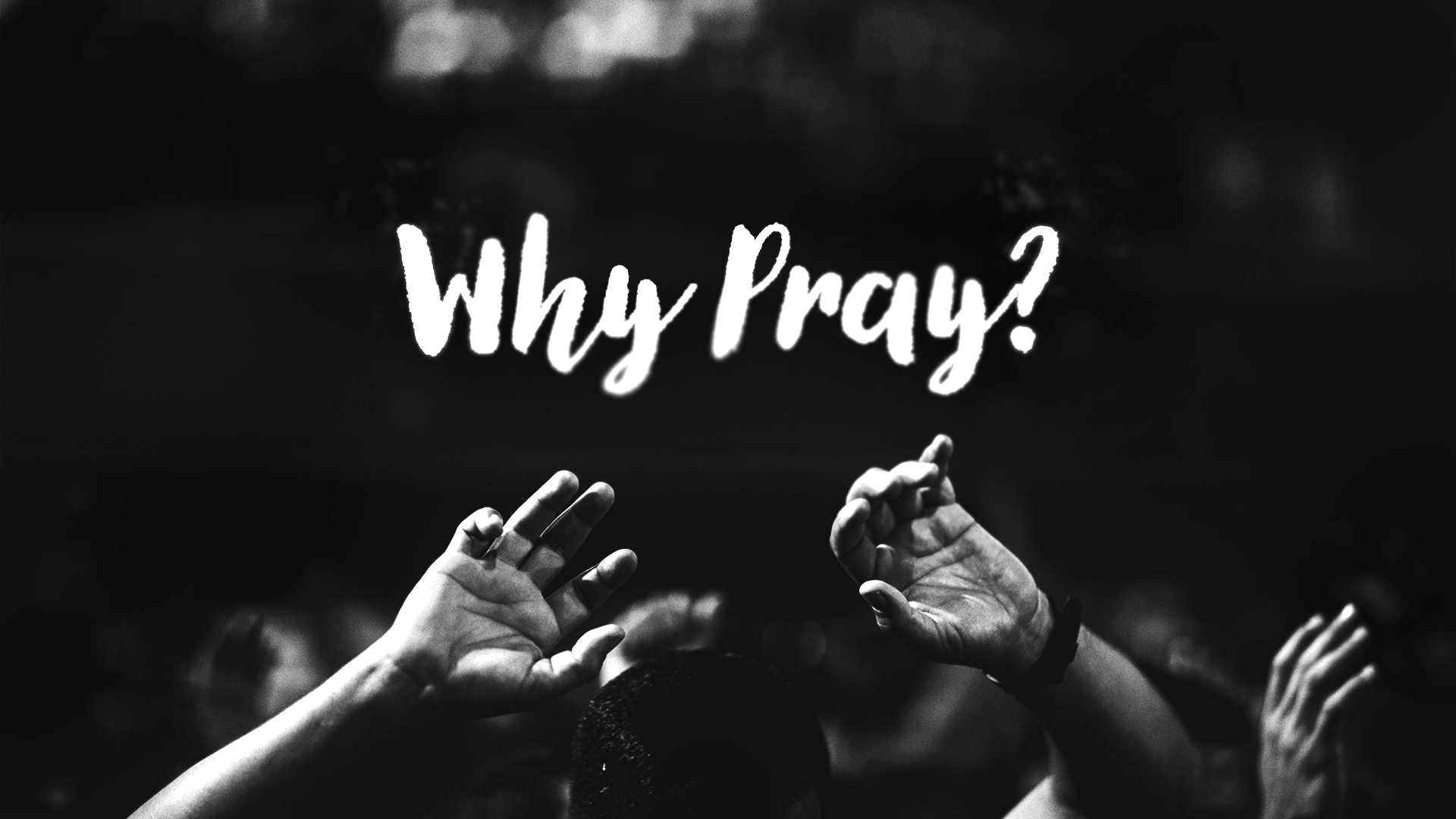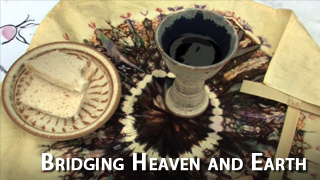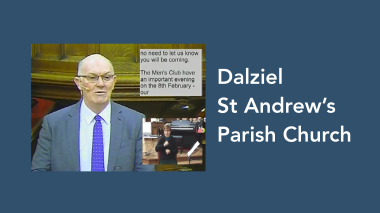Why Pray?

Sometimes we wonder if there really is any point in praying. Can a prayer really change something? Then we go all theological and even philosophical asking ourselves, if God is in charge, can our prayers change his mind? And finally, it gets so complicated we leave the issue hanging in the air. It's as though we finally come to the conclusion God is perhaps too big to be contained in our human propositional theories about his ability to be or not be interested in mere humanity. When I find myself thinking like this I reflect upon the one thing that seems to trump all knowledge of God. It is the belief that God is love. Thus whatever I think or do or say about God I am confronted with an overarching truth which Paul reminds us of in Romans 8. Nothing in all of creation can ever separate us from the love of God.
Perhaps we should remember the above verse when we come to God in prayer. What if prayer is not to change God's mind but to let God change our minds? To allow God's love to shape the way we think about ourselves and others. This kind of praying is mostly about getting to know God and ourselves better rather than treating God like the prayer slot machine. But we need to be careful; simply practicing mindfulness without God in mind is more about self-awareness. Prayer is to practice a selfless mindfulness, helping us to become more God-aware in order to interpret and relate better to the world around us.
However at the outset we need to recognise our knowledge of God will always be limited, for we are finite beings seeking to understand the eternal. As Christians we believe it is through knowing and understanding Jesus that we can start to explore what it means to put our trust and faith in God as our heavenly Father. In doing so we can begin to have a new confidence in our value and purpose in the world. I guess that is why we have this tradition of ending our prayers with the phrase ‘through Jesus Christ our Lord’.
So I want to suggest that it is worthwhile praying for the following reasons because although we cannot grasp the complete magnitude of God there are aspects of God's nature that we can know because of the grace we encounter through the life and death and resurrection of Jesus.
Here are at least four things that the Bible teaches us about the nature of God especially when it comes to prayer. Recognising the significance of these four points I hope might encourage us all to continue to explore the practise of prayer as a daily routine.
 (1) The scriptures teach us that God is complete in himself and knows everything. We call this aspect of God's character his omniscience. I guess it really means, because God is God, he knows all things that can be known, past, present, and future, and he knows them all at the same time. It also means that God is never surprised and that he never learns anything new, not because he is opposed to the new, but because he is an eternal being and 'new' as we know it is something that is understood in time and is part of human experience.
(1) The scriptures teach us that God is complete in himself and knows everything. We call this aspect of God's character his omniscience. I guess it really means, because God is God, he knows all things that can be known, past, present, and future, and he knows them all at the same time. It also means that God is never surprised and that he never learns anything new, not because he is opposed to the new, but because he is an eternal being and 'new' as we know it is something that is understood in time and is part of human experience.
Of course we would find the idea of never learning a new thing a bit constricting, but if God could learn a new thing then he would be constricted, by learning something he didn't know before. And if he was constricted he couldn't be God, but because he operates outside of time his knowledge is not time restricted. When God says he is making all things new, it is not for his benefit but for our hope and expectation of renewal. Engaging in conversation with a loving omniscient creator means we never need to pretend in his company.
(2) The second point is that God has committed himself to provide for his people. Perhaps a better way of saying this is, God wants to provide for us, he intends to provide for us, and he will provide what we need. In Philippians 4:19 Paul assures us that "God will meet all our needs." This is the New Testament version of Psalm 23:1, "The LORD is my shepherd, I shall not want." In another psalm, the psalmist says "Fear the LORD, you his saints, for those who fear him lack nothing.” (34:9), and in yet another scripture God promises that "I will refresh the weary and satisfy the faint" (Jeremiah 31:25).
So when we pray "Give us this day our daily bread," we are praying to a God who has promised to give us all the bread we need precisely when we need it. The whole record of the Bible teaches us that God is the great provider, which is why one of his divine names is Jehovah Jireh "The LORD will provide" (Genesis 22:14). Jesus confirmed all this when he spoke of God as a father who only wants to give good things to his children.He also taught us to consider how God cares for the birds of the air, so we can be sure God cares for us.
We on the other hand have a responsibility to share what we have been given with the poor and needy. This is part of God's provision. The parable of Lazarus at the rich man's gate is a reminder to us all that we withhold our generosity from the poor at our own peril. (Luke 16: 19-31). There is food enough for all in the world, if only we could find a way to share so all can eat and live in peace.
A parable like the above suggests we need to be concerned to bring about a more just society. We have all met Lazarus. In today's world he is no longer at our gate, but actually in our living rooms. For while so many live in great luxury here in the West, we can see the plight of the poor on our screens at the flick of a button. We can be transported to the poorest places in the world and encounter excruciating images of hunger and need. We have in fact the poor in our pockets.
There is something deeply evil about political and corporate systems that can wield enormous power to generate and hoard wealth; yet when it comes to using their influence to create just and fair societies they appear to be impotent. I'm convinced real significant change will happen when individuals begin to use their personal morality to shape the world in which they live pushing against the accepted cultural norms and allowing the poor to hit their pockets.
 (3) Thirdly, despite our unjust world God still invites us to bring our needs to him. We are told to ask, to seek, to knock (Matthew 7:7-8). Why? “Ask and it shall be given, seek and you will find, knock and the door will be opened unto you.” In Psalm 81:10 the Lord promises, "Open wide your mouth and I will fill it." This is where prayer becomes intensely personal. Our Heavenly Father who already knows our needs invites us to make our needs and the needs of known through prayer.
(3) Thirdly, despite our unjust world God still invites us to bring our needs to him. We are told to ask, to seek, to knock (Matthew 7:7-8). Why? “Ask and it shall be given, seek and you will find, knock and the door will be opened unto you.” In Psalm 81:10 the Lord promises, "Open wide your mouth and I will fill it." This is where prayer becomes intensely personal. Our Heavenly Father who already knows our needs invites us to make our needs and the needs of known through prayer.
If this is the case, prayer can not to be seen as a heavenly vending machine. It is about building a lifelong relationship with our creator and Father. Asking God for things is only one small part of prayer. Learning to listen to God in our prayer life is to be open to God's will directing our thoughts and helping us to grasp the bigger picture. The truth is often we don't really know what we want. We think we do, but we don't.
To be more accurate, we know part of our needs, but not all of them. Our perspective is inevitably limited by our own experience, desires and personal knowledge. Romans 8:26 says that "We do not know what we ought to pray for." How true that is.
As a minister many people ask me to pray for a situation. They tell me what they want the outcome to be, but often we don’t know what the right outcome should be. Admitting that we don’t know everything is part of the discipline of prayer. When we don’t pray we’re saying I’m all right I’ve got it sussed. That's why the most basic prayer is always "Thy will be done." But God knows we will often be baffled in prayer so he gave us the Holy Spirit to intercede for us. He prays for us when we don't know how to pray for ourselves or for anyone else.
What an amazing thought, God himself in the person of the Holy Spirit is working out what we really need to be praying about. When you think about that you begin to see how God can guide our lives even when we are not sure the path to take. The slogan 'Try Praying' is not simply an empty soundbite. It is an invitation to enter into an open ended conversation with the almighty.
(4) The fourth point I want to make, following on from this, is that God knows what we need before we ask him. Matthew 6:8 says this very plainly: "Your Father knows what you need before you ask him." So the point of prayer is we don't have to impress God, use big words, or pray long prayers. We don't have to repeat ourselves when we pray and worry about getting all the details correct or throw in flowery language when we pray. Since God knows us through and through, he knows our needs better than we do. When you pray, you aren't informing God of anything. He knew your need before you bowed your head.
 But that brings us back to the original question: If God knows everything before we pray, and if he truly wants to provide for us anyway, why bother praying at all? Isn't prayer just a waste of time? No, God is like a parent watching a child put together a jigsaw puzzle. The parent sits back looking on interested to see the child develop and work out the pieces. As he watches he see the child getting frustrated, but he chooses not to intervene, until the child says daddy can you help me. Now I know that is a bit of an over simplification of things. However there is a sense in which prayer is our way of saying to God ‘I can't do this by myself’. And it is God's delight to hear his children ask him to be part of their process of learning.
But that brings us back to the original question: If God knows everything before we pray, and if he truly wants to provide for us anyway, why bother praying at all? Isn't prayer just a waste of time? No, God is like a parent watching a child put together a jigsaw puzzle. The parent sits back looking on interested to see the child develop and work out the pieces. As he watches he see the child getting frustrated, but he chooses not to intervene, until the child says daddy can you help me. Now I know that is a bit of an over simplification of things. However there is a sense in which prayer is our way of saying to God ‘I can't do this by myself’. And it is God's delight to hear his children ask him to be part of their process of learning.
Let's not give up on prayer. However I think there is so much we can learn from listening to each other's prayers and discovering the amazing effects prayers have on all our lives. Why not enjoy looking through the back catalogue of Sanctuary first prayers. There are now well over 4,000. Happy praying.
Very Rev Albert Bogle




 Add to Favourites
Add to Favourites







Login to comment.